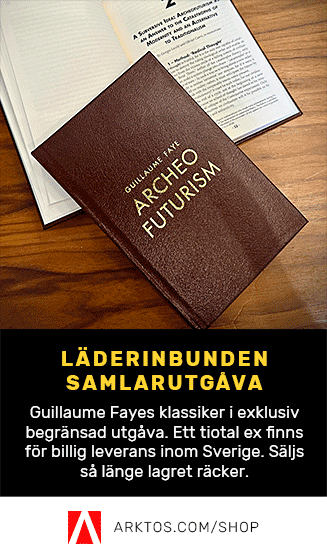För ett halvår sedan intervjuades den franske samhällsfilosofen Guillaume Faye av den populära flamländska tidningen Menzo. Faye sade då att han räknade med ett inbördeskrig med etniska och religiösa förtecken i Frankrike någon gång runt 2010. Intervjun översattes till engelska och återfinns i sin helhet här. Faye sade då följande om Frankrike:
At present, in Seine-Saint-Denis and in certain other departments of the Paris Region (and also in Roubaix and many other large French cities), a majority of the population is no longer of French origin. It’s impossible to integrate such populations.
Economically, the situation is even worse. Out of every one hundred [Third World] immigrants who enter Europe, only five enter the workforce. By contrast, one out of every two French graduates (and the same is true in Belgium) wants to immigrate. This is eventually going to bring down the existing welfare state, which, in turn, will only increase the potential for conflict. The riots we recently experienced [the twenty-one nights of riotous anarchy that occurred in November 2005] are only the prelude to the catastrophe which I expect to happen sometime around the year 2010. Canada’s Wright Foundation is also predicting that in the period 2007-2010, there is going to be an outbreak of ethnic violence in France that will take the form of civil war. It makes this prediction on the basis of a diverse range of statistics, such as increased levels of violence, as well as growing evidence of hidden arms arsenals.
När intervjun publicerades var det många som menade att Faye överdrev (detta berodde delvis på att man lade ribban för vad som är ett inbördeskrig så högt att exempelvis konflikten i Baskien eller Nordirland inte hade räknats som sådana). Men ett halvår senare framstår hans beskrivning som mindre överdriven, då det i en artikel i engelska Telegraph rapporteras om vad franska poliser ser som en fransk ”intifada” (artikeln har mig veterligen inte tagits upp i svenska media, och detta kommer heller inte att ske framöver).
As the interior ministry said that nearly 2,500 officers had been wounded this year, a police union declared that its members were ”in a state of civil war” with Muslims in the most depressed ”banlieue” estates which are heavily populated by unemployed youths of north African origin.
It said the situation was so grave that it had asked the government to provide police with armoured cars to protect officers in the estates, which are becoming no-go zones.
2500 skadade poliser på ett år är betydligt mer än vad exempelvis baskiska ETA någonsin lyckades uppnå, och det är bara en tidsfråga innan dödsoffer börjar krävas (om man låter bli att räkna med de civila döda under upploppen förra året).
However, not all officers on the ground accept that essentially secular interpretation. Michel Thoomis, the secretary general of the hardline Action Police trade union, has written to Mr Sarkozy warning of an ”intifada” on the estates and demanding that officers be given armoured cars in the most dangerous areas.
He said yesterday: ”We are in a state of civil war, orchestrated by radical Islamists. This is not a question of urban violence any more, it is an intifada, with stones and Molotov cocktails. You no longer see two or three youths confronting police, you see whole tower blocks emptying into the streets to set their ’comrades’ free when they are arrested.”
He added: ”We need armoured vehicles and water cannon. They are the only things that can disperse crowds of hundreds of people who are trying to kill police and burn their vehicles.”
However, Gerard Demarcq, of the largest police unions, Alliance, dismissed talk of an ”intifada” as representing the views of only a minority.
Samtidigt som franska poliser betraktas som en främmande ockupationsmakt som ska fördrivas ur de ”egna” bosättningarna, och etniskt franska studenter ses som ”petit blancs” som ska rånas och spöas upp när de vågar sig ut i det offentliga rummet, så fortsätter den politiska och mediala klassen att med envetenheten hos ett litet barn att kräva mer av det som lett till denna situation. Massinvandring.












